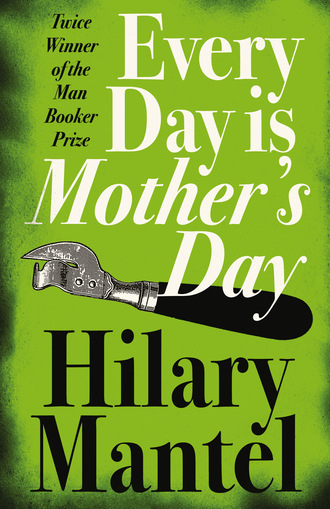
Полная версия
Every Day Is Mother’s Day
‘If you’re going, if you’re going at all, it’s time you got ready. Are you listening to me?’
Muriel sits with her arms clamped down to her sides, willing her mother to turn. The blisters are forming now on her raw skin, the blood has dried. Evelyn shows no signs of recent pain.
‘Here.’ Evelyn goes to the chest of drawers and impatiently wrenches one open, tossing a cardigan and a pair of thick woollen stockings on to the bed. Her water-eyes darting, Muriel sees that Evelyn’s forearms are unmarked. So however it came about that her thoughts were read again (as good as read), even if half an hour ago Evelyn was thinking in her brain, she has not been in all parts of her today. Still, unless…unless the marks will show up later. Evelyn turns, and sees only her daughter’s shuttered face with its habitually blank gaze. She begins again to grumble about the trouble it gives her, getting Muriel ready for the class and setting her going. Only the thought of the Welfare people coming to the house stops her from keeping Muriel at home. ‘What do you want to go there for anyway? Going on a bus with a lot of other people with things wrong with them, cripples and people not right in the head. One day they’ll put them on that bus and take them and gas them, and then you’ll wish you’d stayed at home with your mother.’ She knows Muriel is not listening to her. She is looking sceptically at the clothes on the bed. She goes to her drawers and hunts through for the pink fluffy cardigan.
‘Grey with dirt,’ Evelyn says contemptuously. ‘If you won’t give it me to wash I won’t let you wear it again after this week. They will suppose I don’t see to your cleanliness.’
She gapes. Her jaw unhinges and her eyes grow round. Muriel is not in any doubt now. Evelyn has not been in her body today, not even very much in her brain. She is completely surprised, Muriel thinks. To be helpful, always to be helpful, she holds up her arms for Evelyn’s inspection. A low moan comes from Evelyn.
‘They have been torturing you,’ she says. ‘They have been here in your room, torturing you.’ Moaning again, she washes her arthritic hands together. Could you not cry out? You have gagged me, Muriel thinks. Up the stairs you would have come, rushing to take my pain for yourself. With what? Sharp blades and fire, Muriel says, in her casually dead voice. Now Evelyn is smashing her way out of the room and along the landing, quite heedless of the usual mockery as she passes the door of the spare room, and Muriel can hear her retching behind the closed bathroom door. Putting her hand to her belly, Muriel feels a little wash of the sickness to come.
Now Lauderdale Road, homecoming. Screened by the high bushes, Muriel takes out her coins to count them. Some of them have gone. Spent, she thinks dully, expended. What are these heads, she wonders, whose are these heads upon them? She slips a hand in her pocket and takes out the little looking-glass that she picked up from where it was lying on a counter in a shop. She presses the sides of her skull, to keep in her memory the places she has seen.
Evelyn drives questions into her like hooks. Did they see, did they remark upon your arms, what people were there, were there baskets made at that place, was there singing of songs, of what type and number, kind and shape, were the biscuits you ate? Of the tea, was it pale or brown, is there sugar in that tea, do they give you the sugar as you are accustomed, in lumps or spoons from basins, and do they place it there for you or do you yourself take what you suppose you need? Of the singing: is there piano or other instrument to accompany it? She knows nothing, Muriel thinks with contempt. She makes her face frozen up.
‘Oh, you are stonewalling again,’ Evelyn says furiously. That night when she enters her room she will find it almost festal, the pieces of the torn envelopes littering the carpet and sibilating in the draughts, like confetti.
Department of Social Services
Wilberforce House
3rd May 1974
Dear Mrs Axon,
This is to advise you that the Daycare Sessions attended by Miss Axon will be temporarily suspended for a short period only, due to the demolition of the premises in Calderwell Road, from the Thursday after next. However our sessions are to be resumed at a much better equipped centre at The Hollies, Vernon Road, and you will be advised presently of the new arrangements for transport and etc. If you have any enquiries please contact Miss J. Smith at the address above or telephone.
Yours sincerely,
M. CARTWRIGHT
Social Work Assistant
p.p. Director of Social Services
If they had not been pushing her about that morning, if they had not been trying to do her bodily injury, she would not have smashed the plantpot or found the letter underneath, in the bottom of the basket.
This is old, she said to herself. It has been here for some time. This was May, it is now late June, therefore certainly there have been Thursdays when…there was time unaccounted for. Yet time in the house was moving now at its own speed, in fits and starts. Food decayed on the plates, insects bred in the dark. The place was more and more crowded. Useless to try to talk to Muriel, to ask her for some account of the letter. Muriel rarely spoke now; it was like going back to her childhood. More and more, when Evelyn was in a room with her daughter, she felt as if no one was there.
Department of Social Services
Wilberforce House
3rd July 1974
Dear Mrs Axon,
Mrs J. Smith visited your home on behalf of the Department last Friday, but was unable to gain admittance. The reason for her visit was to ascertain whether Miss Axon had been informed of the new arrangements for attendance at The Hollies, since she has not been present at Daycare Sessions since they resumed. If Miss Axon is ill, perhaps you would be kind enough to notify us, and let us know when she will resume attendance. If you have any problems, please don’t hesitate to contact us.
Jacqueline Smith is now on maternity leave, and I shall be dealing with Miss Axon’s case in future.
Yours sincerely,
CAROL TAFT
At first, Evelyn had said, ‘Perhaps you need not go to this new place. They won’t want you. They are always saying there is pressure on their faculties.’ She was afraid that they would call, and when the knocking did come, at an unaccustomed time of day, she had taken Muriel into the back room and made her sit quietly until the caller had gone away. That morning she had not felt like seeing anyone, combating them, dealing with anyone at all. It had been enough of a shock to find that morning’s trail of messages. First the little mirror that she had never seen before lying on the hall table, a tawdry affair of pink plastic, and the twist of papers round it with the insect capitals: LOOK AT YOUR FASE.
Then she had hunted them through the house: THERE ARE MANY PEOPLE IN THIS PLASE and YOU ARE PUTING IN MY PLASE and SHE SHALL BE PUT IN HER PLASE and, last of all, ANOTHER IS IN HER PLASE.
The day she received the second letter from the Welfare had been much calmer. There had been no messages lately, no buffetings on the landing and stairs, no thefts of her property. It had been Muriel’s problem that was uppermost in her mind; or Muriel’s condition rather. She strove to keep it in perspective. The invention and ingenuity of the parallel world had amazed her in recent months, its many and new manifestations, the closeness of its stinking breath on her neck. Periods of calm followed by new alarms, the torturing of Muriel, the closing off to both of them, permanently now, of certain parts of the house. In the circumstances, Muriel’s pregnancy could only be felt as a lesser shock.
‘Both mad, if you ask me,’ Florence Sidney was saying. ‘You might as well try to fly through the window as help either of them.’
She was standing by the window, which had perhaps helped to indicate the improbability to her mind; she was looking out at her nephew and her nieces, playing among the windfalls in the disarrayed late summer garden. ‘I haven’t seen Muriel for—’ She turned her head. It was painfully evident that her sister-in-law was not listening to her. Sylvia was launched on a series of questions.
‘And may I ask what you intend to do with yourself now?’
‘Do now? Well.’ The questions seemed to make no sense. What does anyone do now?
‘With your life. With the rest of your life. That’s what I’m talking about, Florence.’
‘Well, I’ll do the same as everybody,’ Florence said. Limp on, eyes front, towards the grave.
‘I mean, it’s no kind of life, is it? For anybody?’
‘What had you in mind?’
‘You want to put the past behind you. Get out and live a bit. You want to join some Societies. Get yourself a new girdle.’
Florence didn’t speak. She came away from the window; she never admitted it, but the antics and the shrieking of the children got on her nerves.
‘The trouble with you is that you don’t make the best of yourself,’ Sylvia said. ‘I’m not running you down, I’m only telling you out of the kindness of my heart. You’re no beauty queen, but you could do yourself up.’
‘What for?’ Florence sat down by the tea-trolley.
‘For the fellers,’ Sylvia said conspiratorially.
‘I don’t know any fellows.’
‘Well, and you never will, will you, if you keep mouldering in the house? What’s stopping you now? Your mother’s been put away, you don’t have to stop in and mind her any more.’
‘I wish you would not use that expression,’ Florence said. Any of those expressions really; redolent of your time at the cooked meats factory. Sylvia laughed; she patted her hair, puffed out and lacquered in a style that had passed its apogee some years before. It was impossible to imagine her without this hairstyle; like a helmet, it covered her weakest point, the head. She was, Florence thought, a strange blend of savage self-assertion and abject dependence; pathetic and ferocious by turns. Florence knew so little of the married women of her generation that she imagined Sylvia to be unusual.
‘It is a home for the elderly,’ Florence said. ‘A sanctuary for the twilight years.’
‘Get away,’ Sylvia said. ‘Your mother’s off her rocker. Colin doesn’t keep any secrets from me.’
‘Really?’ Florence said. ‘By the nature of a secret, you would not know if he did.’
‘You’ve room to talk, about the folks round the corner.’
‘It wasn’t idle gossip. I haven’t seen them for some time. They are old neighbours, though they are not people whom we have known. I am concerned.’
Sylvia yawned, leaning back and allowing her fingers a token flutter before her mouth.
‘You want to be concerned with yourself. I’m telling you. Smarten yourself up and get out a bit. The trouble with this family, it’s too introvert.’
‘Oh, is that Colin’s trouble?’, Florence asked.
‘Well, he was introvert.’
‘But you remedied it.’
‘What kind of a life is that?’ Sylvia asked. ‘I had other offers. I could have got married four times over.’
‘That might have been unwise,’ Florence said gently. ‘You know, you’ve changed, Sylvia. You will have your opinions now. I remember when Colin first brought you home.’
Sylvia blushed furiously. So she remembers too, Florence thought. Father had been alive, of course, quite hale and hearty. Mrs Sidney wore a new Crimplene suit in powder blue with bracelet-length sleeves. She herself put on a beige jersey wool. There were fruit scones and a Victoria sandwich. Mother’s gimlet eyes spotted a traycloth insufficiently starched, and (although often they were not starched at all) she whisked it off. As she waited to meet the girl her son intended to marry, one pointed finger rubbed and rubbed at a spot on the wooden arm of her chair. It had been summer, a day very like this. Sylvia’s substantial black brassiere had shown clearly under her short cotton frock, and she had emitted great guffaws of nervous laughter whenever she was addressed. Father had been exquisitely civil. Colin had not known where to look. Florence and her mother had agreed later that, seeing her in the setting he was used to, Colin would be sure to see that he was making a mistake. But he hadn’t.
‘I let your blasted mother put on me,’ Sylvia said. ‘I’d know better now.’ From upstairs came the sound of the lavatory flushing.
‘Unfortunately it isn’t given to any of us to have our opportunities over again. Or what would you do if you could? Perhaps since you are now so dissatisfied with your life, you ought to have looked the other way when you saw Colin on the tram.’
‘I can assure you,’ Sylvia said, ‘that I didn’t meet Colin on any tram.’
‘It would be nothing to be ashamed of if you had.’
‘I assure you.’
‘She couldn’t have,’ said Colin, coming in. ‘It’s not possible.’
‘I understood you met on a tram. I’m not saying anything against it.’
‘Couldn’t have been on a tram,’ Colin said. ‘I’m not saying we wouldn’t have been on a tram, either Sylvia or myself, but I happen to recall that the trams had stopped running some years previously. It was on the railway station that we met.’
‘I knew public transport was involved somewhere,’ Florence said.
‘And what have you got against it?’
Florence smiled faintly. ‘Nothing.’
‘Only I was going to say, your father made his living out of it, didn’t he, people falling off buses.’
‘Yes, my love,’ Colin said. ‘We are all staunch supporters of public transport in this house. Perhaps that’s why you caught my eye. You so clearly approved of it too.’
‘You were a while,’ Sylvia observed, ‘in the toilet.’
‘Allow me a few moments’ privacy,’ Colin said. ‘Confine your interest to the children’s bowel movements, not mine.’
‘The topic of romance on trams has worn thin,’ Florence said. ‘I see that we must have something else. Sylvia sees it too.’
Defiantly, Colin took out a cigarette and lit it. Love is blind, Florence thought: for a year or two.
‘Unhygienic habit,’ Sylvia said. ‘I gave it up when I was pregnant with Suzanne. I read it in a magazine. Smoking and Pregnancy.’
‘Sylvia takes magazines devoted to housewifery,’ Florence said. ‘Does she have recipes making use of frozen chicken which are both tasty and economical?’
‘I know what you eat,’ Sylvia said. ‘Bread and jam.’
‘In its place,’ Florence murmured.
‘Tea,’ said Colin.
‘I know. And tomato sandwiches. I don’t think Colin had ever had a proper meal in his life until we got married.’ She got up. ‘We’ll be off, Florence.’ She went out through the kitchen to the back door. ‘Come on, you lot, we’re off.’
An argument ensued. Florence could hear the protests of the children overridden by Sylvia’s firm flat voice. It made her nervous. If they wanted to stay, it probably meant that they were engaged in some form of covert vandalism. ‘The roses,’ she said nervously.
‘Roses.’ Colin put his head in his hands. ‘You ought to get some cabbages in. The cost of living being what it is.’
‘Oh, I couldn’t. They were Father’s roses.’
‘Grub them up,’ Colin said. ‘That’s it. Grub them up.’ He groaned quietly, then stood up, stretching himself. He was a man on poor terms with his clothes—his shirt always coming out of his waistband, his trousers shooting up around his calves as he sat; it was difficult not to see this as a symptom of a more general failure of control. He had once been remarkably good-looking, but now his looks had faded, as if his features were doubtful of their application in his current circumstances. His habitual expression was one of anxious astonishment, like that of a man who has been stopped in the street by a policeman and finds he has forgotten his name. ‘Where’s my pullover?’ he said, looking about. He hauled it over his head and smoothed his thinning fair hair.
‘You’re ageing, Colin,’ Florence said in a low voice.
‘Ah well. At my back I always hear time’s wingèd chariot etc. It’s been ten years you know, me and Sylvia. I should have thought the amusement would have palled. You hurt her, you know. She cries. She isn’t entirely the jolly factory lass you take her to be.’
‘Come on, Colin.’ Sylvia was standing in the doorway holding the hands of her two younger children. ‘Thank you very much, Florence. Say thank you to your Auntie for the nice tea.’
Freeing their hands, pushing past Florence, the children whooped out to the car. Sylvia followed them.
‘I wanted your opinion,’ Florence said. ‘About Mrs Axon and her daughter.’
‘I have no opinion,’ Colin said. ‘Mrs Axon has lived around the corner for as long as I can remember without having done anything to warrant my having an opinon on her.’ His shirt had come out again; he was stuffing it back, hauling at his belt. ‘You know, Florence, Sylvia’s quite right. You’ve got to make a life of your own.’
Outside, Sylvia wound the car window down. ‘Colin, are you coming?’
‘Anon, good Sylvia, anon. You see, the problem is, you were geared up to years of self-sacrifice, looking after Mother. Now all that’s aborted…well, you know what I mean. Eh, old girl? Pop over next Sunday.’ A peck on the cheek. She stood in the porch watching Sylvia wind the window up again. There was something incongruously patrician about Sylvia’s averted profile, her mouth was set, her chin sagging. Colin hunched himself into the driver’s seat.
‘It’s a flaming bloodsport,’ Sylvia said.
‘Sorry, love,’ On a sudden whim Colin transferred his hand from the knob of the gearstick to her knee. He patted it. ‘You mustn’t let her get you down. She’s lonely, you know.’
Sylvia sniffed. ‘Come on, let’s get home.’
Colin steered along Buckingham Avenue with his usual caution. The little saloon forced him to drive with his arms stiffly extended, as if he were fending off the week ahead.
‘You were getting at me,’ she said.
‘Well, just a bit.’
‘Florence sets you off.’
‘I said I’m sorry. Can we have a bit of peace? I said,’ he raised his voice for the children in the back, ‘can we have a bit of peace?’
The most difficult thing was not knowing: how many months. Evelyn took down the calendar and pored over it. You could not be positive that the missing Thursdays were implicated. That would be a jump altogether too far ahead.
‘Do you want to go to the doctor?’ she said. ‘It would cost.’
Muriel said that it was free now.
‘Free? Nothing’s free. What sort of stupid talk is that?’
She didn’t know what was going on in the world, Muriel said craftily. Craftily, because it was Muriel’s scheme to have her inadequacy prick her, so that she would buy a television set. Evelyn wouldn’t have one in the house, not while she was alive; and after her death she expected to exercise some sway. After all, they hadn’t missed the radio when it had broken down, and they didn’t feel the lack of newspapers. Soon after the last war Muriel had been sent with the month’s money to the newsagent’s. It had been wrapped up in a piece of paper, and she had lost it. Evelyn couldn’t see her way to finding the money twice over. So the shop had stopped delivering. Evelyn had never read them anyway. All the news was the same, and all bogus. The papers took no cognizance of the other world, except when they found some cheap talk of poltergeists or table-turning to fill the pages up.
‘And where do you go?’ she demanded of Muriel. ‘Where do you go, that you know so much?’
Muriel didn’t answer that question. Either Evelyn knew where she had been, and was mocking her, or she did not; in which case, her powers were on the wane, the long battle was drawing to an end. They tell you what’s free at the Class, Muriel said. They tell you what you can get for nothing.
It was strongly in Evelyn’s mind now that it must be someone from the class who was the father of Muriel’s child. But it was no use bothering Muriel about it, no use trying to get anything out of her. It did cross her mind that something malign in the house might be responsible for the girl’s condition; but she had to admit that in her extensive experience she had not heard of such a thing. There were unnatural unions, but did they come to fruition? Muriel looked as if she would come to fruition, quite soon. No, surely her first thought was right. The lax Welfare had turned their backs. Some half-wit had prevailed on a quarter-wit. Only one thing she would have liked to find out; was he in some way deformed?
Social Services Department
Luther King House
Tel: 51212 Ext. 27
10th October 1974
Dear Mrs Axon,
I must apologise for the delay in contacting you, but Miss Axon’s file was mislaid when the Department moved to new offices recently, and has only just come to hand.
As Miss Axon has not attended our Daycare Sessions since the move to The Hollies, we are anxious to know whether any difficulty has arisen. Miss Taft of this Department wrote to you on July 3rd, but you may perhaps have overlooked this letter. If it is convenient for you, I will call at your home on October 15th at about 3 pm, and I will hope to see Miss Axon then and have a chat with her. If this date is not convenient perhaps you would kindly telephone me at the number above.
Miss Taft is now attending a course, and as she will be away for six months Miss Axon’s case has been handed over to me. I hope to be able to help you with any problems that arise.
Yours sincerely,
ISABEL FIELD
Конец ознакомительного фрагмента.
Текст предоставлен ООО «ЛитРес».
Прочитайте эту книгу целиком, купив полную легальную версию на ЛитРес.
Безопасно оплатить книгу можно банковской картой Visa, MasterCard, Maestro, со счета мобильного телефона, с платежного терминала, в салоне МТС или Связной, через PayPal, WebMoney, Яндекс.Деньги, QIWI Кошелек, бонусными картами или другим удобным Вам способом.








